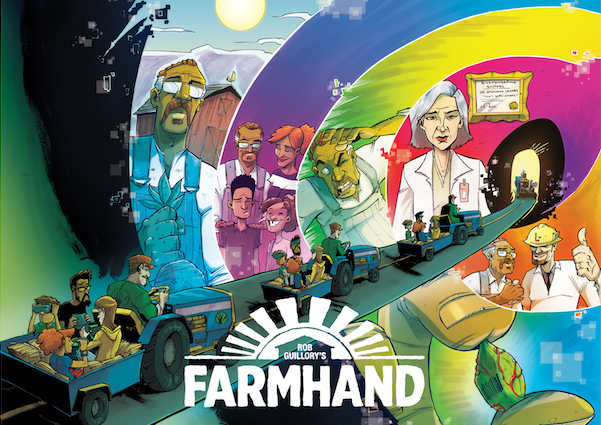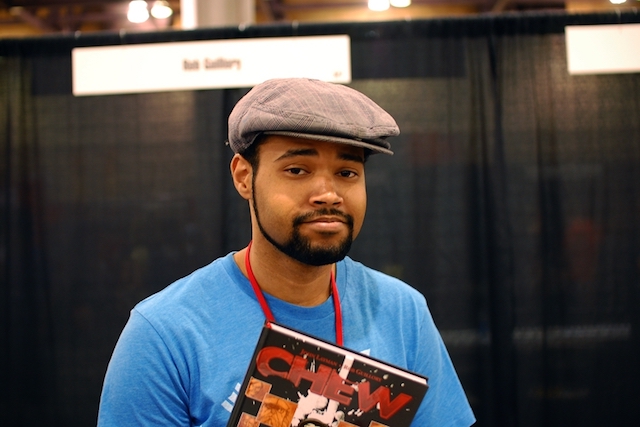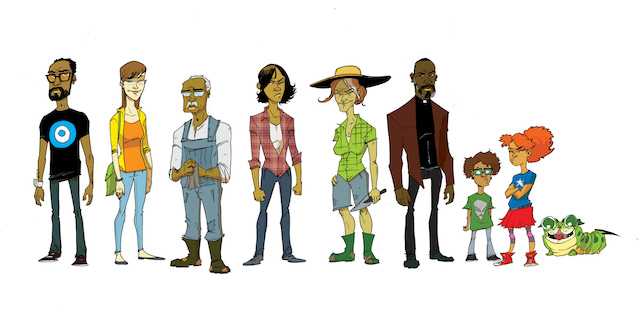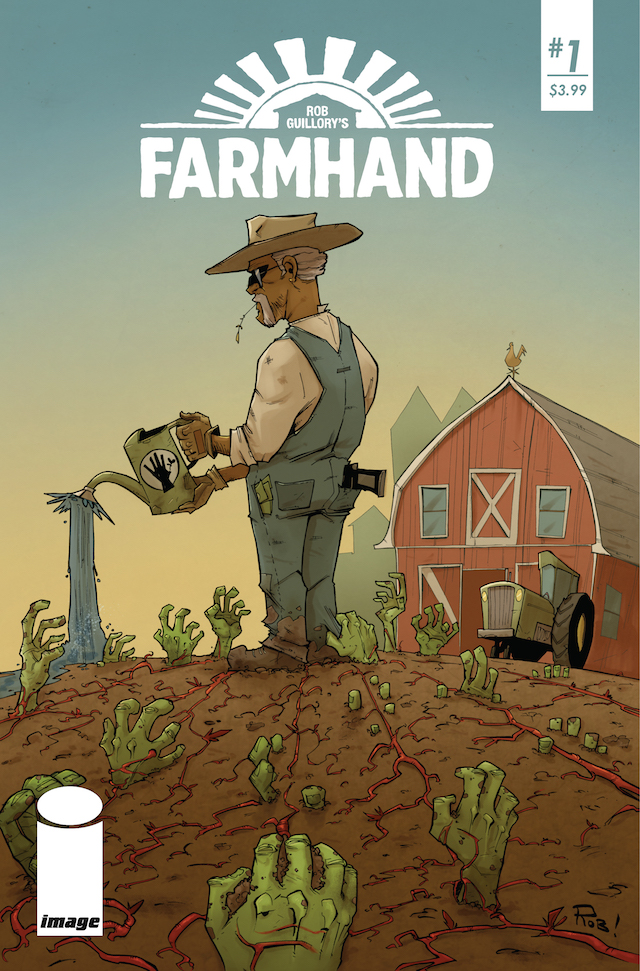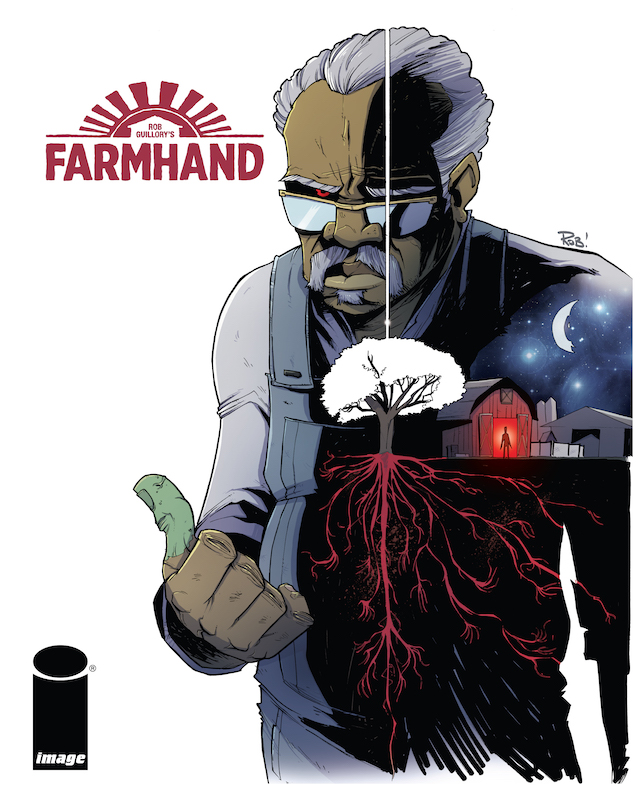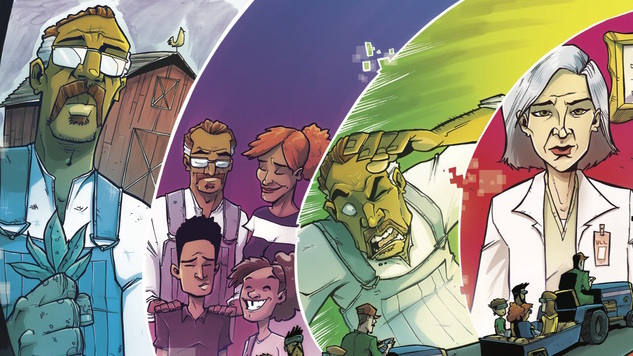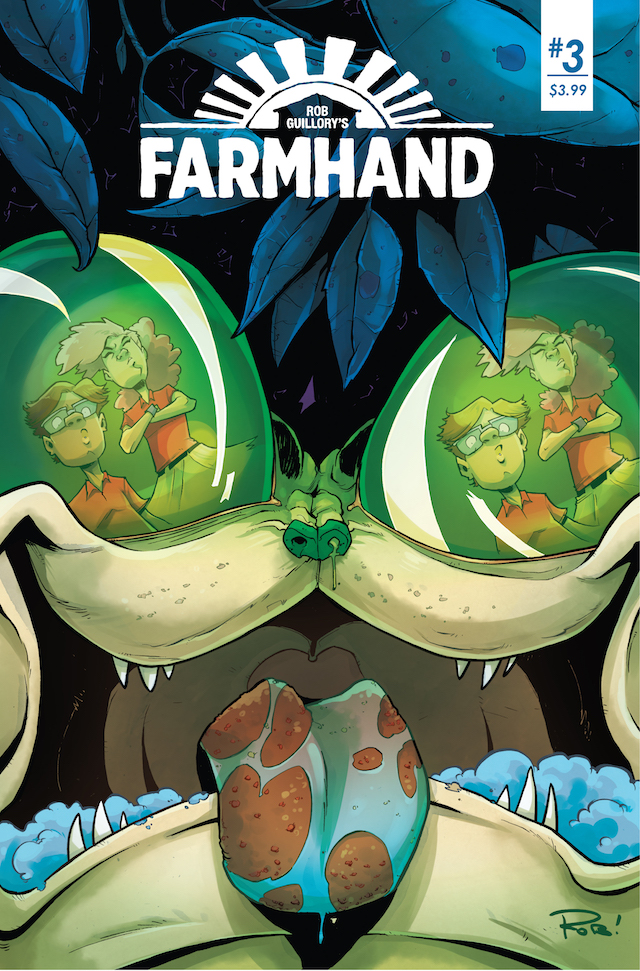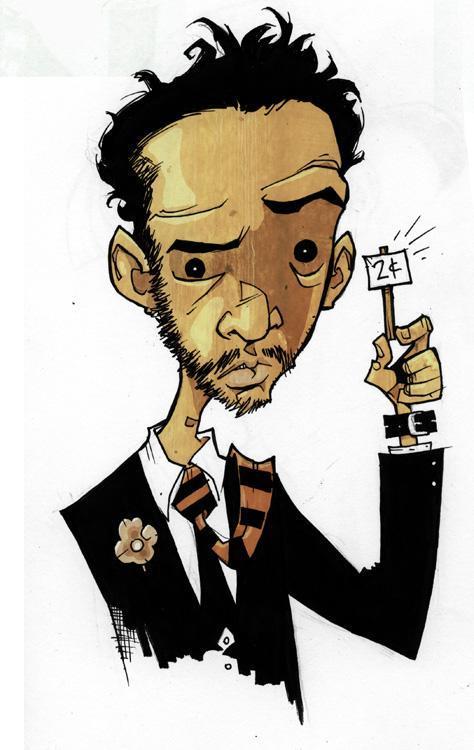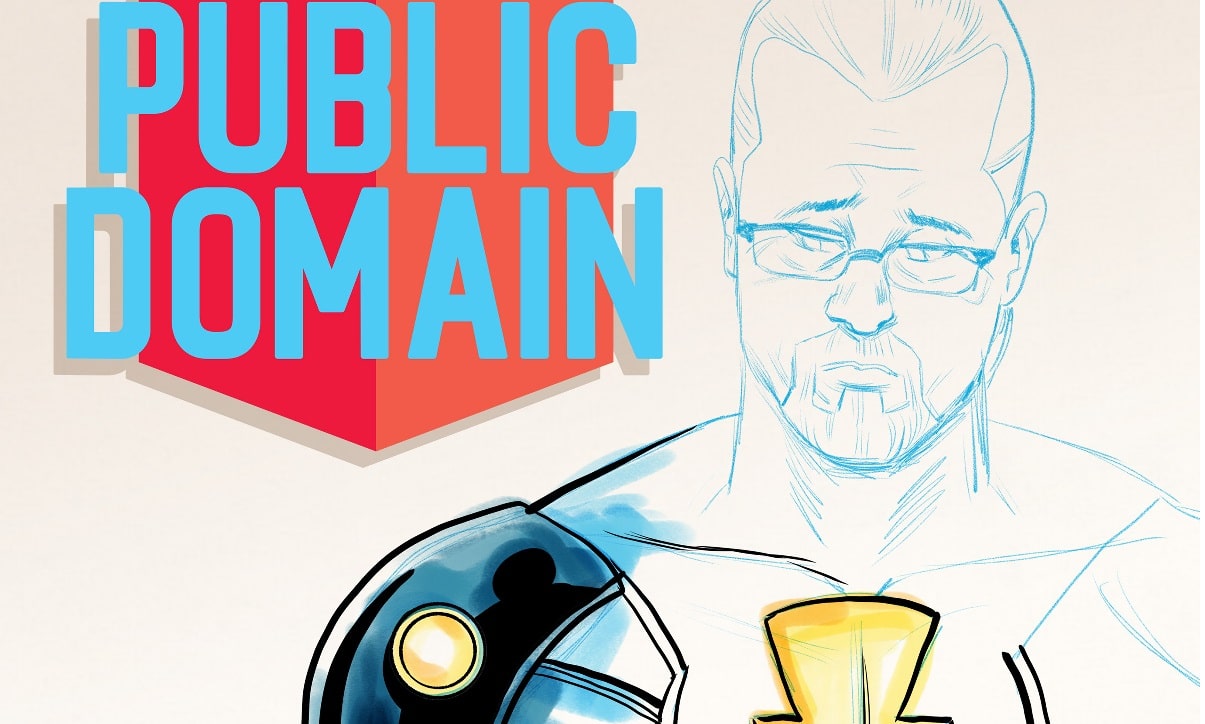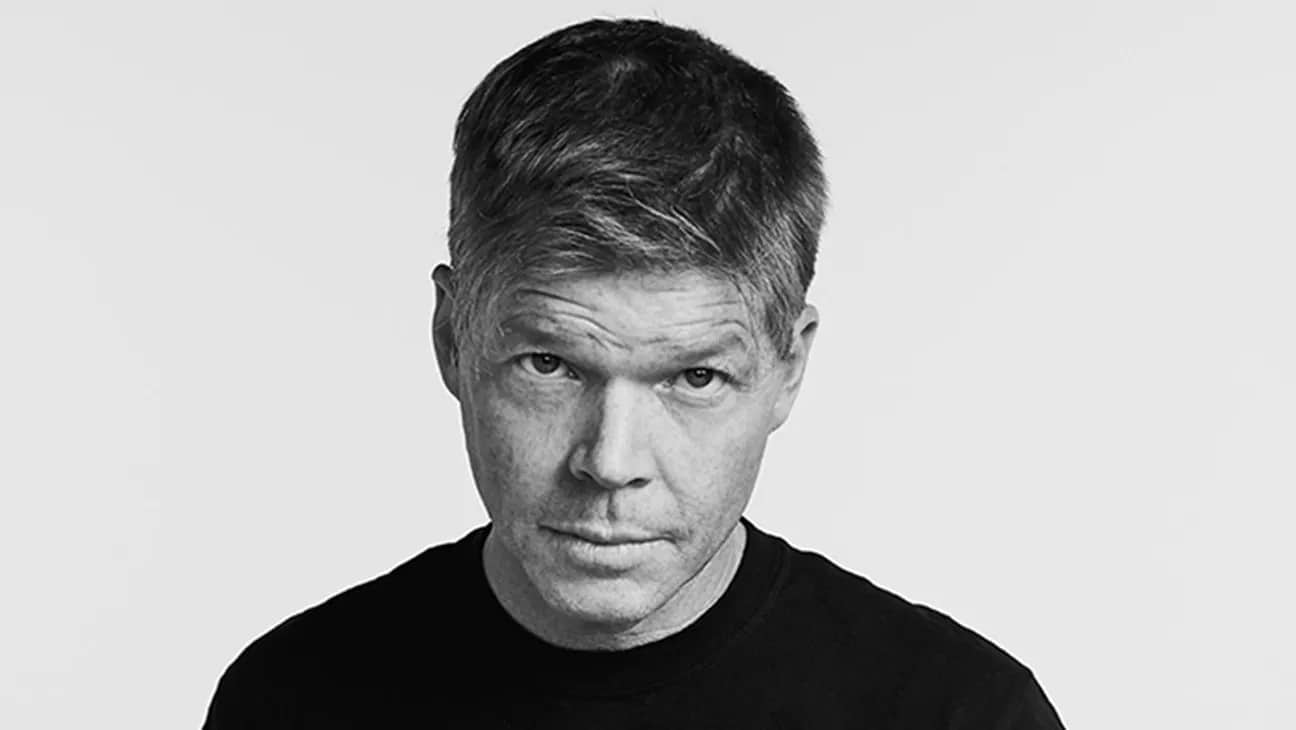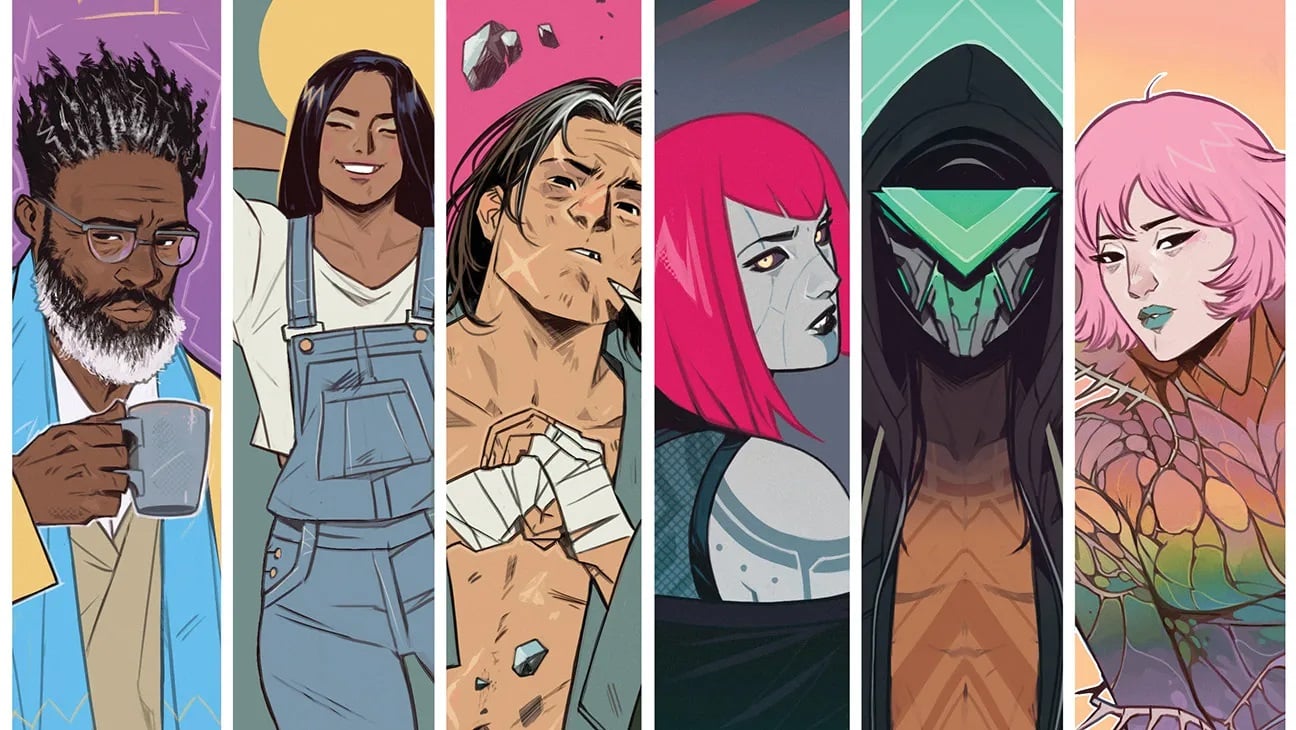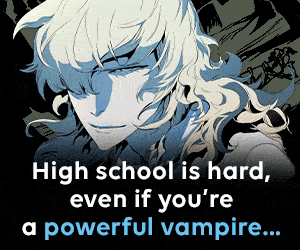Family is at the center of Farmhand, specifically main character Zeke’s relationships with the family he was born into and the family he chose. Rob Guillory has created a comic lending that sense of family, occasional wackiness in a similar vein as CHEW, and a foreboding tinge of horror together to excellent results. I interviewed Rob about launching the series, his development as a writer, handing the coloring and lettering duties to others, and much more.
FARMHAND #1 debuts July 11 and has the order code MAY180011
Zeke bears a strong resemblance to yourself. Were he, his wife, and his children designed with your own family in mind?
Other than the fact that we’re both incredibly handsome black guys with families and lots of body hair, I’m afraid the comparison ends there. (Laughs.)
But seriously, of course, I’m drawing from some of my experiences as a family man in the writing of the Jenkins family. I think every creator draws from their well of experience to some degree. I’m no different. There are some things in the characters that are like people I know, and there are some things totally foreign to anyone I know. I knew folks would look at Zeke and immediately ask “Is Rob drawing himself?” And I suppose the answer is no and yes.
Why did you make the main character a writer as opposed to, say, a cartoonist?
Well, I knew I wanted Zeke to be a creative from the beginning, as his creative bent is actually pretty crucial to his overall role in FARMHAND. As I mentioned before, Zeke is the closest thing to a touchstone for me in this story, so I felt comfortable setting him up as something familiar to me, then building his character outward into unexpected territory from there. Really, that’s been my entire approach to FARMHAND. Begin with a setting that’s familiar and comfortable, then reveal that things are not at all what they seem to be.
Jedidiah and Ezekiel are very uncommon names nowadays. What made you decide on the names of the Jenkins?
Some of it was simply because the names sounded really “country”. Like, you’d expect to meet a Jedidiah on some backwoods farm, but you’d never expect a Jedidiah to be the new chairman of Apple, ya know? So part of it was me screwing with people’s expectations, as I rather enjoy doing. But yes, they are Old Testament Bible names that I was drawn to. Jedidiah is a Hebrew name that means “Beloved of God”, and it was the name God gave to Solomon, who was known for his unparalleled wisdom. So it made sense to give it to my Jedidiah, whose entire story begins with this seemingly supernatural wisdom that creates the Jedidiah Seed. And Ezekiel was one of the greatest Old Testament prophets, who saw insane supernatural visions. So that fit my Zeke as well.
Like Chew, Farmhand has a wacky concept that has the potential for deep exploration and many different kinds of stories. Is that coincidence, or did you want to stick to a familiar wheelhouse for your first ongoing series as a writer and artist?
When I first pitched (CHEW co-creator) John Layman my rough concept for FARMHAND, he warned me that I might be typecast as “the guy who does really weird stories”. But after eight years of CHEW, I’m pretty sure I’m already that guy, so I might as well roll with it. I didn’t start out with some formula when creating FARMHAND. This idea began with a very simple and weird premise that organically grew into something with a very rich mythology. And really, this is the only story I felt drawn to telling. It’s just that simple. I wanted to make a comic that’s unlike anything else out there, and sometimes being original looks wacky at first.
How much do you think interpreting John Layman’s scripts for a decade influenced your voice as a writer?
Sitting under Layman for almost a decade taught me a ton about the craft, what works and what does not. But before CHEW, I wrote all of my own stuff, so I already had a voice of my own. Mostly, I learned from Layman how to have the courage to tell the story I feel called to tell, regardless of others’ opinions.
Beyond Layman, who would you cite as influences on you as a writer?
Honestly, as a writer, I’ve always been more influenced by television and books than comics. I think a lot of my thinking was shaped by guys like Rod Serling, Stephen King, and Ray Bradbury to name a few. Comics-wise, of course, Alan Moore’s Watchmen was huge for me (and every other comic creator since).
You mentioned during your appearance on the Off Panel podcast that you’re writing the series full script. Is it equally detailed as scripts you received for CHEW and other projects, or do you take shortcuts since you know you’re the one who will be drawing the comic?
My scripts are fairly detailed, just because I tend to have fun shaping the world in the script. I don’t really take any shortcuts, simply because I’m anal that way. I write as if I’m writing for another artist. And because I usually write scripts months before I ever draw them, by the time I begin art on a new issue, it’s like I’m drawing for a different writer.
You decided not to color and letter the series yourself as you did with CHEW. Did you find it hard to let go of the control that gave you as an artist?
Yes and no. I just knew I wouldn’t be able to handle coloring FARMHAND with my additional duties as a writer, so I reached out to my CHEW color assistant Taylor Wells and offered her the gig. After working together for 40+ issues, she knows my work really well, and I knew that she could bring her very own flair to this book that would bring out a new facet of my art. It was odd to give up that control at first, but I’ve really learned to love the collaboration. Taylor’s been killing it.
Your letterer and designer Kody Chamberlain is a great cartoonist himself. Have his storytelling sensibilities played a hand in shaping Farmhand?
Well, Kody’s an old friend and an immensely talented comic creator in his own right, as well as the best graphic designer I know. I was really curious what he’d come up with if he applied his skill with type to this book, and he’s been fantastic. His letters have really played a huge role in shaping the complete package of FARMHAND.
Even the most pre-outlined story tends to find a way to surprise its author. How has Farmhand grown and changed the more of it you make?
Like I said, it began with a really simple concept: An organic farmer that grows human organs. I appreciated the pun, and immediately loved that I could do horror, sci-fi, comedy, and drama all from that simple foundation. But as I began to craft the characters and this world, I was surprised at how much “there” there was to the story. What started out as a shallow thing, the more I dug into it, the more I found its roots to be far deeper and darker than I could’ve expected. Suddenly, it wasn’t about farming or weird body part plants. It was about the human condition, the condition of the soul and the roots of evil. That’s deeper than expected, but that’s fertile soil for a great story, I think.
FARMHAND #1 debuts July 11 and has the order code MAY180011. You can follow Rob on Twitter and via his website. Also, check out his store where you can purchase original art, sketchbooks, and an adorable Blue Chog plush.
Matt Chats is an interview series featuring discussions with a creator or player in comics, diving deep into industry, process, and creative topics. Find its author, Matt O’Keefe, on Twitter and Tumblr. Email him with questions, comments, complaints, or whatever else is on your mind at [email protected].



